How come 的用法
- 格式:doc
- 大小:31.50 KB
- 文档页数:2
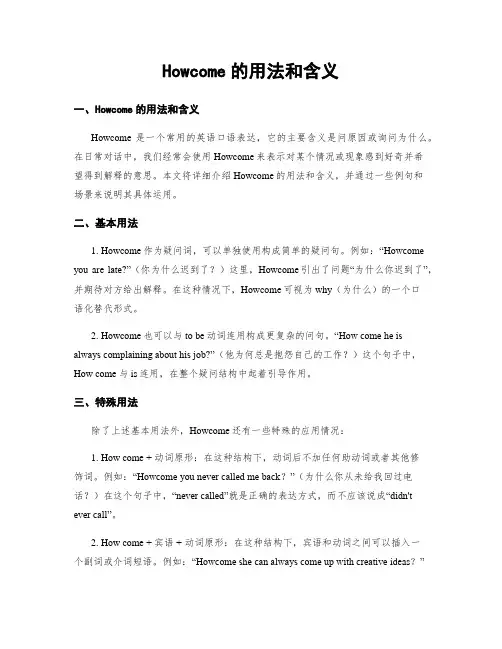
Howcome的用法和含义一、Howcome的用法和含义Howcome是一个常用的英语口语表达,它的主要含义是问原因或询问为什么。
在日常对话中,我们经常会使用Howcome来表示对某个情况或现象感到好奇并希望得到解释的意思。
本文将详细介绍Howcome的用法和含义,并通过一些例句和场景来说明其具体运用。
二、基本用法1. Howcome作为疑问词,可以单独使用构成简单的疑问句。
例如:“Howcome you are late?”(你为什么迟到了?)这里,Howcome引出了问题“为什么你迟到了”,并期待对方给出解释。
在这种情况下,Howcome可视为why(为什么)的一个口语化替代形式。
2. Howcome也可以与to be动词连用构成更复杂的问句。
“How come he is always complaining about his job?”(他为何总是抱怨自己的工作?)这个句子中,How come与is连用,在整个疑问结构中起着引导作用。
三、特殊用法除了上述基本用法外,Howcome还有一些特殊的应用情况:1. How come + 动词原形:在这种结构下,动词后不加任何助动词或者其他修饰词。
例如:“Howcome you never called me back?”(为什么你从未给我回过电话?)在这个句子中,“never called”就是正确的表达方式,而不应该说成“didn't ever call”。
2. How come + 宾语 + 动词原形:在这种结构下,宾语和动词之间可以插入一个副词或介词短语。
例如:“Howcome she can always come up with creative ideas?”(为什么她总能提出创意十足的想法?)句子中的“always”对于副词来说是合理的,它强调了她总是能够做到这一点。
3. How come + that从句:当我们想要询问某件事情背后的原因时,可以使用How come引导一个that从句。
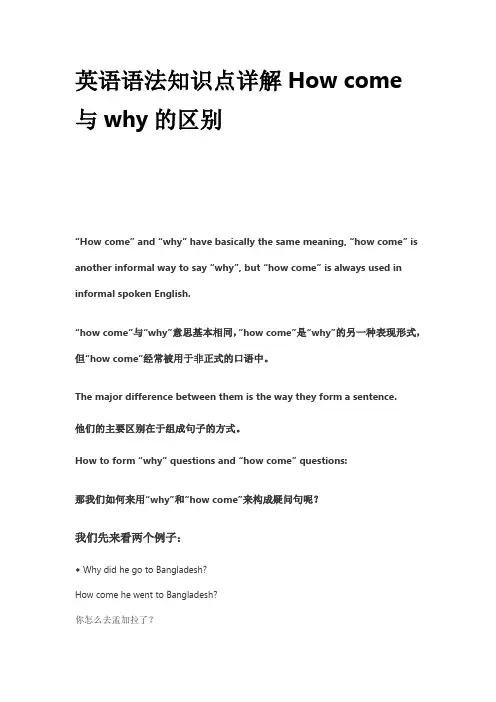
英语语法知识点详解How come 与why的区别“How come” and “why” have basically the same meaning, “how come” is another informal way to say “why”, but “how come” is always used in informal spoken English.“how come”与“why”意思基本相同,“how come”是“why”的另一种表现形式,但“how come”经常被用于非正式的口语中。
The major difference between them is the way they form a sentence.他们的主要区别在于组成句子的方式。
How to form “why” questions and “how come” questions:那我们如何来用“why”和“how come”来构成疑问句呢?我们先来看两个例子:◆ Why did he go to Bangladesh?How come he went to Bangladesh?你怎么去孟加拉了?◆Why didn’t you call me last night?How come you didn’t call me last night?你昨天晚上怎么没给我打电话?To ask a question with “why” you would change the order of the subject (you) and the verb (are), as in this question:用“why”提问,你需改变句子的主语(如例句中的you)和谓语(如例句中的are)的语序:Why did you go to London?你为什么去伦敦了?But when we use “how come,” the word order of the statement does not change:用“how come”提问,句子的语序无需做出改变:How come you went to London?你为什么去伦敦了?But we do not conjugate “how come.”但我们不对“how come”进行词形变化如How came you went to London?的句子是错误。
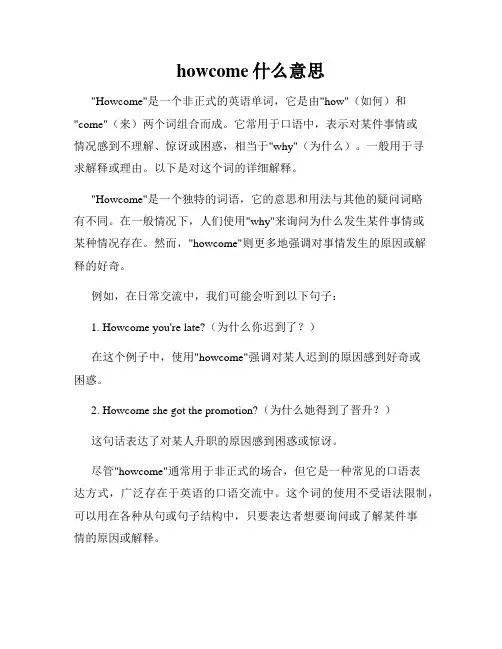
howcome什么意思"Howcome"是一个非正式的英语单词,它是由"how"(如何)和"come"(来)两个词组合而成。
它常用于口语中,表示对某件事情或情况感到不理解、惊讶或困惑,相当于"why"(为什么)。
一般用于寻求解释或理由。
以下是对这个词的详细解释。
"Howcome"是一个独特的词语,它的意思和用法与其他的疑问词略有不同。
在一般情况下,人们使用"why"来询问为什么发生某件事情或某种情况存在。
然而,"howcome"则更多地强调对事情发生的原因或解释的好奇。
例如,在日常交流中,我们可能会听到以下句子:1. Howcome you're late?(为什么你迟到了?)在这个例子中,使用"howcome"强调对某人迟到的原因感到好奇或困惑。
2. Howcome she got the promotion?(为什么她得到了晋升?)这句话表达了对某人升职的原因感到困惑或惊讶。
尽管"howcome"通常用于非正式的场合,但它是一种常见的口语表达方式,广泛存在于英语的口语交流中。
这个词的使用不受语法限制,可以用在各种从句或句子结构中,只要表达者想要询问或了解某件事情的原因或解释。
总结起来,"howcome"是一种非正式的英语单词,用于表示对某件事情的原因或解释感到好奇、困惑或惊讶。
它在口语交流中被广泛使用,尽管它的使用不被语法限制,但仍然是一个非正式的表达方式。
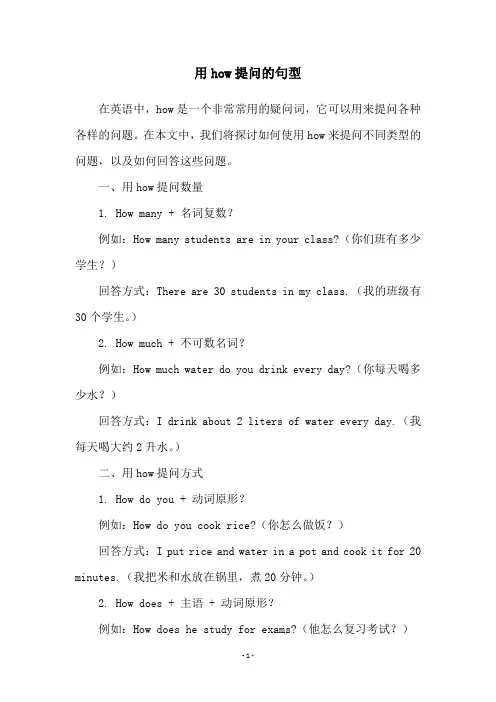
用how提问的句型在英语中,how是一个非常常用的疑问词,它可以用来提问各种各样的问题。
在本文中,我们将探讨如何使用how来提问不同类型的问题,以及如何回答这些问题。
一、用how提问数量1. How many + 名词复数?例如:How many students are in your class?(你们班有多少学生?)回答方式:There are 30 students in my class.(我的班级有30个学生。
)2. How much + 不可数名词?例如:How much water do you drink every day?(你每天喝多少水?)回答方式:I drink about 2 liters of water every day.(我每天喝大约2升水。
)二、用how提问方式1. How do you + 动词原形?例如:How do you cook rice?(你怎么做饭?)回答方式:I put rice and water in a pot and cook it for 20 minutes.(我把米和水放在锅里,煮20分钟。
)2. How does + 主语 + 动词原形?例如:How does he study for exams?(他怎么复习考试?)回答方式:He studies by making flashcards and taking practice tests.(他通过制作闪卡和进行模拟考试来复习。
)三、用how提问情况1. How are you?例如:How are you feeling today?(今天感觉怎么样?)回答方式:I'm feeling great, thanks.(我感觉很好,谢谢。
) 2. How is + 名词?例如:How is your new job?(你的新工作怎么样?)回答方式:It's going well so far.(到目前为止,一切都很好。
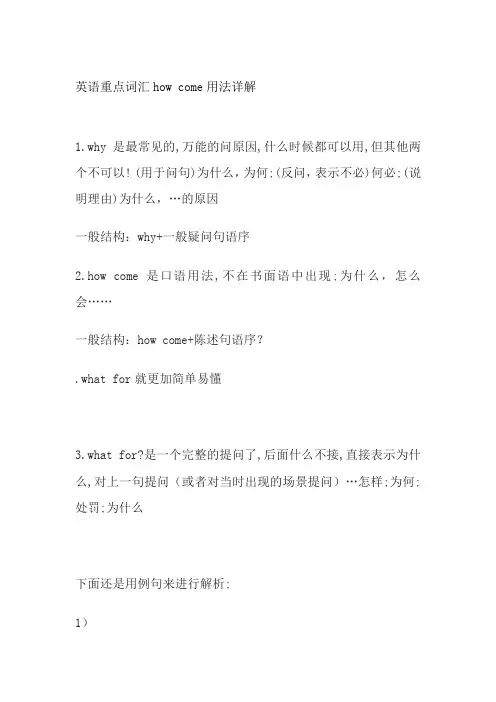
英语重点词汇how come用法详解1.why 是最常见的,万能的问原因,什么时候都可以用,但其他两个不可以! (用于问句)为什么,为何;(反问,表示不必)何必;(说明理由)为什么,…的原因一般结构:why+一般疑问句语序2.how come 是口语用法,不在书面语中出现;为什么,怎么会……一般结构:how come+陈述句语序?.what for就更加简单易懂3.what for?是一个完整的提问了,后面什么不接,直接表示为什么,对上一句提问(或者对当时出现的场景提问)…怎样;为何;处罚;为什么下面还是用例句来进行解析;1)Why were you late?你为什么迟到?Tell me why you did it.告诉我你为什么这样做。
‘I would like you to go.’‘ Why me? ’“我希望你去。
”“为什么要我去呢?”Why oh why do people keep leaving the door open? 人们到底为什么总敞着门呢?Why get upset just because you got one bad grade? 何必因为一次成绩不好就想不开呢?Why bother to write? We'll see him tomorrow.还费事写信干什么?我们明天就见到他了。
Why hasn't he brought the whisky?他为什么没把威士忌拿来?《柯林斯高阶英汉双解学习词典》Why don't you look where you're going?走路怎么不看着点儿道呢?《柯林斯高阶英汉双解学习词典》Why didn't he stop me?为什么他没阻止我?《柯林斯高阶英汉双解学习词典》Why can't I remember the exact year we married?为什么我记不起我们结婚的准确年份了?Why don't you come home with me until you sort things out? 你何不先和我一起回家,等事情解决了再走?2)'How come we never know what's going on?' he groused “为什么我们对正在发生的事情总是一无所知?”他抱怨说。
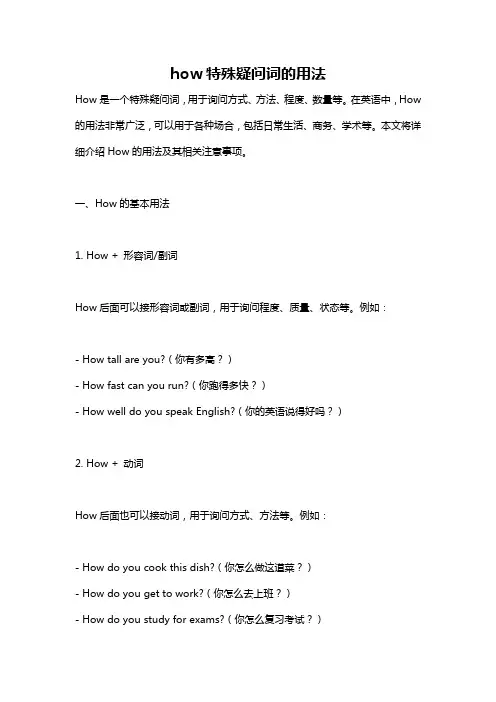
how特殊疑问词的用法How是一个特殊疑问词,用于询问方式、方法、程度、数量等。
在英语中,How 的用法非常广泛,可以用于各种场合,包括日常生活、商务、学术等。
本文将详细介绍How的用法及其相关注意事项。
一、How的基本用法1. How + 形容词/副词How后面可以接形容词或副词,用于询问程度、质量、状态等。
例如:- How tall are you?(你有多高?)- How fast can you run?(你跑得多快?)- How well do you speak English?(你的英语说得好吗?)2. How + 动词How后面也可以接动词,用于询问方式、方法等。
例如:- How do you cook this dish?(你怎么做这道菜?)- How do you get to work?(你怎么去上班?)- How do you study for exams?(你怎么复习考试?)3. How + 名词How后面还可以接名词,用于询问数量、质量等。
例如:- How many books do you have?(你有多少本书?)- How much money do you make?(你赚多少钱?)- How long have you been studying English?(你学英语多久了?)二、How的注意事项1. How的语序在使用How时,需要注意语序。
一般来说,How后面接的是形容词、副词、动词或名词,而不是主语。
因此,正确的语序应该是How + 形容词/副词/动词/名词+ 主语。
例如:- How tall are you?(你有多高?)- How fast can you run?(你跑得多快?)- How do you cook this dish?(你怎么做这道菜?)- How many books do you have?(你有多少本书?)2. How的回答在回答How的问题时,需要根据具体情况进行回答。
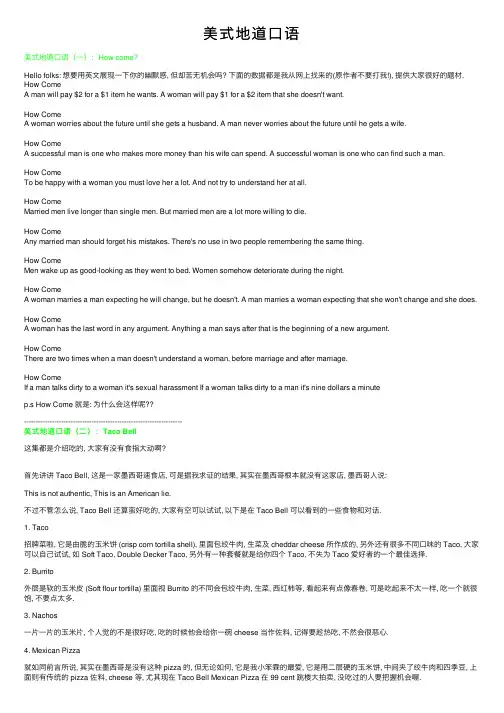
美式地道⼝语美式地道⼝语(⼀):How come?Hello folks: 想要⽤英⽂展现⼀下你的幽默感, 但却苦⽆机会吗? 下⾯的数据都是我从⽹上找来的(原作者不要打我!), 提供⼤家很好的题材. How ComeA man will pay $2 for a $1 item he wants. A woman will pay $1 for a $2 item that she doesn't want.How ComeA woman worries about the future until she gets a husband. A man never worries about the future until he gets a wife.How ComeA successful man is one who makes more money than his wife can spend. A successful woman is one who can find such a man.How ComeTo be happy with a woman you must love her a lot. And not try to understand her at all.How ComeMarried men live longer than single men. But married men are a lot more willing to die.How ComeAny married man should forget his mistakes. There's no use in two people remembering the same thing.How ComeMen wake up as good-looking as they went to bed. Women somehow deteriorate during the night.How ComeA woman marries a man expecting he will change, but he doesn't. A man marries a woman expecting that she won't change and she does. How ComeA woman has the last word in any argument. Anything a man says after that is the beginning of a new argument.How ComeThere are two times when a man doesn't understand a woman, before marriage and after marriage.How ComeIf a man talks dirty to a woman it's sexual harassment If a woman talks dirty to a man it's nine dollars a minutep.s How Come 就是: 为什么会这样呢??--------------------------------------------------------------------美式地道⼝语(⼆):Taco Bell这集都是介绍吃的, ⼤家有没有⾷指⼤动啊?⾸先讲讲 Taco Bell, 这是⼀家墨西哥速⾷店, 可是据我求证的结果, 其实在墨西哥根本就没有这家店, 墨西哥⼈说:This is not authentic, This is an American lie.不过不管怎么说, Taco Bell 还算蛮好吃的, ⼤家有空可以试试, 以下是在 Taco Bell 可以看到的⼀些⾷物和对话.1. Taco招牌菜啦, 它是由脆的⽟⽶饼 (crisp corn tortilla shell), ⾥⾯包绞⽜⾁, ⽣菜及 cheddar cheese 所作成的, 另外还有很多不同⼝味的 Taco, ⼤家可以⾃⼰试试, 如 Soft Taco, Double Decker Taco, 另外有⼀种套餐就是给你四个 Taco, 不失为 Taco 爱好者的⼀个最佳选择.2. Burrito外层是软的⽟⽶⽪ (Soft flour tortilla) ⾥⾯视 Burrito 的不同会包绞⽜⾁, ⽣菜, 西红柿等, 看起来有点像春卷, 可是吃起来不太⼀样, 吃⼀个就很饱, 不要点太多.3. Nachos⼀⽚⼀⽚的⽟⽶⽚, 个⼈觉的不是很好吃, 吃的时候他会给你⼀碗 cheese 当作佐料, 记得要趁热吃, 不然会很恶⼼.4. Mexican Pizza就如同前⾔所说, 其实在墨西哥是没有这种 pizza 的, 但⽆论如何, 它是我⼩笨霖的最爱, 它是⽤⼆层硬的⽟⽶饼, 中间夹了绞⽜⾁和四季⾖, 上⾯则有传统的 pizza 佐料, cheese 等, 尤其现在 Taco Bell Mexican Pizza 在 99 cent 跳楼⼤拍卖, 没吃过的⼈要把握机会喔.5. Taco Salad另外⼀样 Taco Bell 的特⾊, 传统的⽣菜加上四季⾖, ⽟⽶脆饼, 西红柿等, 放在⼀个⽤⽟⽶脆饼作的⼤碗⾥, 看了就觉得很好吃!以上是主要的 Taco 菜单, 可能不是很完整, 其它的就交由各位去尝试之后再告诉我了. 以下是会话:6. For here or to go?这⾥吃还是外带?去速⾷店店员问你的第⼀句话通常是这⼀句, 不要急著点餐, 先回答这⼀句再点.7. Does it go with drinks?有没有附赠饮料?有些套餐有附饮料, 如果不确定, 可以问⼀下, 如果没有的话, 可以当场点.8. Is that all?就这些了吗?有时他们会⽤ anything else? 总之, 这⼆句都是⼀样的, 如果是, 就回答 That's it!9. Here you go!你的餐来了!这句话在美国⽤的相当普遍, 你拿什么东西给别⼈, 就可以说这⼀句, 另外跟这句很类似的是 There you go! 通常⽤在会话的结尾, 表⽰我同意你的看法, 和 Here you go 是不太相同的!--------------------------------------------------------------------美式地道⼝语(三):南⽅这个圣诞假期我到⼀个位于阿肯⾊州的美国接待家庭住了⼗六天, 不但住在他们家⾥, 也参加他们⼀般的家庭聚会, 陪他们⼀起上教堂, 上餐厅.当然也跟他们⼀起过了⼀个美好的圣诞节. 我常在想, 要把英⽂学好, 真的是要让⾃⼰处在⼀个英⽂的环境中, 每天讲每天⽤, 英⽂就会进步很快. 像我这次就真的是受益良多. 打铁趁热, 赶快来看看我学到了什么有⽤的东西, 这些都是在美国南⽅才⽐较会⽤到的⼀些句⼦.1. What are you fixing right now?你现在在煮什么?Fix 这个字以我个⼈的理解就是代表"修理", 或是"固定"的意思, 但是在美国 fix 这个字真的是千变万化, 例如在美国南⽅, ⼤家习惯⽤ fix 来代替cook 或是 make, 例如 A: What are you fixing now? B: No big deal, I'm just fixing my own dinner. 但是 fix 这种⽤法⼀般说来在南⽅⽐较流⾏,从北⽅来的⼈可能会听不懂这样的⽤法. 另外 fix 也可以被动的形态出现, 例: How do you like your coffee fixed? 就相当于 How do you like your coffee cooked?2. I am fixing to go out.我正准备要出门.Fix 这个字在美国南⽅真的很常见, 记得我第⼀次听到⽼美这么跟我说, 我的直觉反应就是他正在修理什么东西, 但实际上 Fix 在这⾥的⽤法是正准备要出门的意思, 也就相当于 I am about to leave.3. I'll fix the plate for you.我等下帮你准备⾷物.第⼀次听到我室友说 I can fix the plate for you, 我⽴刻反应是, Is there any plate broken? 其实不是这样的. Fix the plate 指的是准备⾷物. 例如我们在炒菜前可能会先把所有要炒的菜都洗好, 分好, 放在盘⼦上准备好像, 这就叫 Fix the plate. 所以下次如果再听到⽼美说 I'll fix the plate 可别以为他把盘⼦给打破了喔!I fix a plate for you. 也可以释成我帮你拿⼀点⾷物. ⼤家应该都有吃过西式的 buffet 吧! ⼀个⼈⼀个盘⼦, ⾃⼰去拿菜, 如果你要帮别⼈拿⾷物的话, 你就说, I'll fix a plate for you.4. She spent 30 minutes fixing her hair.她花了三⼗分钟整理她的头发.像 fix 这么好⽤的单字在国内居然没有⼈教真是可惜. Fix 在这⾥是指整理头发的意思. 我⾃⼰造了⼀个好玩的句⼦, She is fixing to fix her hair and fix the plate before fixing her dinner. ⼤家看得出来在这⾥四个 fix 各有不同的意思吗? 翻译⼀下这句话就是她准备好要在煮晚饭之前整理她的头发和准备⾷物了. (没什么意思, 只是好玩⽽已.)5. Can you fix mine?你能不能帮我捡⼀下?这句是我最近才新学到的, 所以 fix 的⽤法⼜多了⼀个, 就是有⼆个⼈在丢罐⼦, 他们想把罐⼦丢到垃圾筒⾥, 结果第⼀个⼈没丢准, 丢到垃圾筒外⾯去了, 换第⼆个⼈丢, 他还是没丢准, 也丢掉外⾯去了. 所以当第⼆个⼈要去把罐⼦捡起来时, 第⼀个⼈就跟他说了, Can you fix mine? 能不能帮我捡起来丢到垃圾筒⾥. 我觉得这个 fix ⽤的特别好.6. He is a redneck.他是⼀个⽼粗.所谓 redneck, 就是⼀些种⽥的粗⼈, (特别是在南⽅) 因为他们特殊的⽣活习惯和癖好, 通常会闹出很多笑话, 说起话来有很重的南⽅⼝⾳, 他们会被叫 redneck 我想是因为常在⽥⾥⼯作, 脖⼦晒的红红的之故, 另外还有⼀个字 hick, 也是粗⼈ redneck 的意思.什么样的⼈是典型的 redneck 呢? 他们喜欢穿迷彩服, 缺了好⼏颗门⽛, 他们开著烂烂的 pickup truck , 他们车上⼀定会放⼀把枪, 以便可以随时打猎. 他们住的院⼦通常会堆满各式各样的杂物, 以致于看起来好像垃圾场⼀样. 如果想要更了解关于 redneck 的⼀些有趣的事情, 可以参考本专栏的 redneck's driver's license 这⼀篇笑话.7. He has a bad accent.他有很重的⼝⾳.在美国不同的区有不同的⼝⾳, 特别是在南⽅, 他们叫作 southern drwal, 原因是他们通常喜欢把尾⾳拉长, 所以叫 southern drawl. ⽽在整个南⽅当中, 我觉得⼜以 Kentucky 及 Tennessee 的⼝⾳最重了. 如果你连这⼆个地⽅的⼝⾳都能了解的话, 那你的英⽂⼤概也没什么问题了.⼀般⽽⾔, 在美国如果有⼝⾳是会被当作⼟包⼦的! 所以⽼美之间也常拿彼此的⼝⾳开玩笑. 由其你如果是在北⽅例如纽约⼯作, 你的南⽅⼝⾳很可能会使得同事们都看不起你.8. You are not spposta to stay home during the weekend.你周末不应该待在家⾥的.讲到⼝⾳, 我就来教各位⼀些很典型的南⽅⼝⾳吧! 南⽅⼈喜欢把 suppose to 念成 spposta 我第⼀次听到别⼈这样说我还以为他在说 I am a poster (我是⼀张海报), 害我觉得很奇怪说, 其实这就是他们的⼝⾳. 还有⼀个我常听的就是 You rurnt my life. (You ruin my life) 他们会把 ruin 念成 rurut.9. Heidi, Hire Yew?嗨, 你好吗?这句话也是很典型的南⽅打招呼⽤语, 我想这原来是 Howdy, How are you? 但是他们会念成 Heidi, Hire Yew. 我想虽然南⽅⼝⾳普遍被认为不是那么好, 可是有时你刻意去模仿⼀两句反⽽会有那种爆笑的效果, 就如同我们也喜欢说 "粉" 可爱, 不也是台湾国语但听来却是格外地亲切吗?10. Oh hell no.当然不是啦.这也是南⽅的⼀个惯⽤语, 特别是⿊⼈很喜欢这么说. Oh hell no 其实就是等于 Of course not. 那个 Oh hell 是⽤来加强语⽓的. ⽐如你问我, Are you married? 我就可以回答. Oh hell no. I am still single.也许美国的南⽅不如北⽅那么进步, 但是这⼉的⼈们却多了⼀份的纯朴, 有空不妨也到南⽅来看看!--------------------------------------------------------------------美式地道⼝语(四):Up & Down这集要来跟各位介绍⼀下 up 跟 down 这两个字的妙⽤. 诸位也许不知道, 这两个字除了代表上下之外, 也有北上和南下的意思, 当然也有⼤声⼩声的⽤法, 还有尊敬跟瞧不起的意思. 真是妙⽤⽆穷. 我们快点来看看在⼝语中要如何活⽤ up 跟 down 这两个字.1. Did you get down to Florida last summer?你上个暑假有去佛罗⾥达吗?英⽂中有⼀点很好玩⽽且跟中⽂很像的地⽅就是, 在中⽂⾥通常我们会说, 我南下⼴州, 或是北上吉林, ⽽不单纯说我去⼴州或我去吉林. 英⽂中也是这么⽤的喔! 像是你南下 Florida , 就会说成 get down Florida 或是 go down Florida.Get down 还有很多其它的意思, 不要搞混了. 例如记下某⼀句话你就可以说 I'll get down what you said today.2. Have you heard of Buffalo, New York? My parents live up there.你知道⽔⽜城吗? 我的⽗母住在那边.南边的地⽅通常会加 down, 那北边就是加 up 了. 你说 live up there 那⼀定是指在北⽅. 像⽔⽜城地理在美国的北⽅, 我在亚特兰⼤就可以跟别⼈说 My parents live up there. 但要是你⼈在加拿⼤, 那这句话就要说成 Live down there. 因为⽔⽜城是在加拿⼤的南⽅. 所以⽤ up 或 down 全视南⽅或北⽅⽽定.3. I went to Europe last month because my friends live over there.我上个⽉去欧洲, 因为我的朋友住那⾥.我想⼤家⼀定会很好奇, 那东边⼜怎么说? 西边⼜怎么说? 通常他们不分东边或是西边,⼀律⽤ over there 或是 out there. ⽐如说你在美国, 你的朋友住欧洲. ⽽美国和欧洲并没有很明显的东西之分. 这时你就可以说 live out there 或是 live over there.4. How have you been up there?你在那⾥过得如何?How have you been 是⼀句⽇常的问候语, 就相当于你最近过得怎么样了. 加上 up there, 则表⽰那个⼈可能是从北⽅来的. 或是可能刚从北⽅回来. 我刚来美国时有⼀次到波⼠顿去玩, 回来之后有⼀个⽼美就问我 What did you do up there? 那时就是因为不知道 up there 代表什么意思害我楞在那⾥半天.5. I drove all the way up to Boston.我⼀路开车到波⼠顿.All the way 翻成中⽂就是"⼀路到底" 的意思. 这个⽚语常跟 up 或 down 合⽤, 例如你说 I drove all the way up there. 或是⽐⽅说去溜滑梯, 你就可以说 You can slide all the way down to the the bottom.6 . Hey, look at the girl up there.嘿. 看看在上⾯的那个⼥孩.要注意⼀下 up 和 down 不完全当北边和南边解释. 要看上下⽂⽽定. 像在这个句⼦⾥, up there 代表的是在上⾯的意思. 因为在⽇常的对话中我们不太可能说, "看看北边的那个⼥孩" 我们只会说, 看看上⾯的那个⼥孩. 所以英⽂中的道理也是⼀样的. 同理, Look the girl down there 就是看看在下⾯的那个⼥孩.7. Never look down on people less superior than you.不要轻视不如你的⼈.Look down on someone 就是说你看不起⼈家, 有点像是中⽂⾥狗眼看⼈低的意思. 所以才会说 Look down. 要是很看得起某⼈, 则是说 Look up on someone.8. Can you keep it down?你能不能保持安静.Up 和 Down 也常常⽤来表⽰声⾳的⼤⼩喔. Keep it down 就是保持⾳量不要太⼤. 像是有⼀次我们在考试, 结果⾛道上还有⼀些⼈在喧哗. 我是很想叫他们⼩声⼀点但是苦于不知要如何开⼝. 还好我同学这时挺⾝⽽出, 跑去跟他们说 Can you keep it down?9. Could you turn it up?能不能把它开⼤⼀点.凡是电器类的产品, 开⼤⼀点就叫 turn up, 关⼩⼀点就是 turn down. 例如你希望冷⽓开强⼀点, 就是 Could you turn it up? 关⼩⼀点 Could you turn it down? 其它像是电视的⾳量开⼤也叫 turn up, 关⼩叫 turn down. 附带⼀提如果是打开则是 turn on, 关掉叫 turn off.这期的笔记本⼀⼝⽓介绍了许多实⽤的 up 跟 down 的⽤法给⼤家, 希望⼤家都能记得住.--------------------------------------------------------------------美式地道⼝语(五):钱出门在外就是⼀定要花钱的, 所谓有钱好办事, 胆⼩的⼈有钱也能靠钱来壮壮胆. 但是有钱也不能⽼装阔, 凡事还是先问问⼈家, "这个东西要不要钱?" (先想想这句话英⽂要怎么讲) 有⼀次我跟⼀个待在美国已经⼀年的朋友出游, 我发现他因为不会问 "你们收不收钱?" 这种简单的句⼦,结果就是害我们每⼈⽩⽩被敲诈了⼀块美⾦. ⼀块美⾦虽然是⼩钱, 但⼼⾥上却另⼈觉得不怎么愉快. 这到底是怎么⼀回事呢? 让我们来看看这篇关于钱钱的故事.1. Do you take money?你们要收钱吗?很多东西真的⼀定要先问清楚才⾏, 天底下真的没有⽩吃的午餐这种事情. 尤其美国的⼀些⼤城市路上有很多街头艺⼈, 穿著奇装异服, 有些观光客好奇拿著照相机喀喳⼀声, 他就跑过来跟你要钱了. 有⼀次更扯. 我同学说我们⼤家跟他合照⼀张, 结果他每⼈跟我们收⼀块美⾦. 哪有这么好赚的事? 但是照⽚都照了⼜不能说不给. 所以出国观光, 这种简单的句⼦⼀定要熟记. Do you take money? 要是他说 Yes, 再问他 How much? 这样才不会吃亏.这句话你也可以简单地问, Is it free? 但是记得, There's no such thing as a free lunch. 看到有⼈站在那⾥, 就该⼼⾥有数了.2. You owe me three dollars.你还要找我三块钱.说真的, 我也是来美国好⼀阵⼦之后, 才知道 "找"钱要怎么说. ⽼美的说法就是, 你还⽋ "owe" 我⼏块钱. 他们没有 "找钱" 这个动词. ⽐如说你去买东西他应该找你三块, 可是他可能忘了, 这时你就可以提醒他, You owe me three dollars.3. Let's call it a wash.剩下的不⽤给了!假设我⽋你 9.8 块, 你⽋我 10 块钱, 这时说 Let's call it a wash, 就是" 差不多, 不⽤算了, 不⽤计较" 的意思罗! 不过说真的这句话我问过⽼美,有些⽼美也不知道, 所以并不是很常⽤就是了.4. Pass the hat.⼤家出钱吧.有⼀次要跟⽼美要去系上的聚会, 我好奇地问他们, Is it free? 结果有个⽼美跟我说. pass the hat. 害我当场楞在那⾥不知如何是好, ⼜问了⼀次, 他还是说 pass the hat. 事后才知道, 原来 pass the hat 就是说拿个帽⼦跟⼤家收钱, 看你要交多少随意. 因为在国外的乞丐都是拿帽⼦讨钱的, 跟台湾拿碗的不太⼀样. 所以说法也就不同.如果你去参加了⼀个所谓 pass the hat 的聚会, 就⼀定会⽤到 put in (plug in) 这个动词. 这个动词就是每个⼈ "出多少钱" 的意思. 例如, Everybody puts in 5 dollars. 就是每个⼈出五块钱.5. Let's chip in 20 dollars to buy him a present.让我们⼤家凑⼆⼗块钱帮他买份礼物吧.Chip in 就是⼤家出钱的意思, 这跟以前介绍过的 pass the hat 有点类似. 但 pass the hat 指的多半是⼤家⾃⼰出⾃⼰的, ⽽ chip in 则是说每个⼈出⼀点钱,把这个钱拿去作⼀件事. 可能是买礼物啦, 或是分担⼀些共同的费⽤. 例如有⼀次我去别⼈家玩, 结果很不幸的门不知道为什么被锁住了, ⼤家都进不住, 这时就有⼈说, OK. Let's chip in some money to call the locksmith.6. Have you ever seen a silver dollar?有没有看过⼀元的硬币?⽼美的硬币每个都有⼀个名字, ⼀分钱叫 penny, 五分是 nickel, ⼀⾓是 dime, ⼆⾓五是 quarter, ⼤家都知道, 另外有⼀元的硬币较少见, 叫silver dollar, 想看的⼈可以去投邮票⾃动贩卖机, 它就会找你很多⼀元的硬币, 另外值得⼀提的是, 各位如果有机会去赌城⼤西洋城玩, ⼀定要找⼀个叫 nickel paradise 的地⽅, ⾥⾯的吃⾓⼦⽼虎都是投nickel 的, 保证可以让你玩到⼿酸.另外, ⽼美习惯上把 dollars 也讲成 bucks, 例如⼗元你可以说 ten dollars 或是 ten bucks ⼆个都⼗分常⽤. ⾄于千元, 你可以说 one thousand 或是 one grand 都是千元的意思. (注意⼀下, ⼆千的话是 two grand ⽽不是 two grands 这个 grand 是不加复数的.)最新消息, 美国⾃ 1999 年起, 规定各州可以发⾏⾃⼰的 quarter. 所以现在美国境内所流通的 quarter 可说是五花⼋门, 所以下次再拿到 quarter 时不妨多看两眼, 有兴趣的话⼤家⼀起来收集!7. How much is the cover?⼊场费是多少钱?美国的⼀些夜⽣活场所例如舞厅, 电动游乐场等, 都有所谓的⼊场费 (cover). 这个 cover 通常是不包括饮料以及吃东西的消费. 另外⽼美有⼀个⽐较⼝语的问法, How much to get in? 问的也是 cover 是多少钱. 所以下次如果再跟⽼外去 night club, 不妨问⼀声, How much is the cover?或是, How much to get in?8. I am broke.我很穷.以前在国内说⾃⼰很穷总喜欢⽤ I am poor 这样的句⼦. 但我发现在美国 I am poor ⽤得并不多. ⼀般会⽤到 poor 这个字都是讲穷⼈ poor people ⽽⾔, 当然说我很穷⽤ I am poor 也没错. 可是相较之下说 I am broke 的更多. ⽐⽅说别⼈邀请你去吃饭, 你可以说 No, I am broke. Maybe next time.9. She just got a sugar dad.她找到⼀个有钱的⽼男⼈.有些年轻貌美的⼥性会去认⼀些有钱, 但是⽣活⽆趣的⼈当乾爸, 甚⾄是跟⼈家拍拖, 为的就是看看能不能得到什么好处. 这种有钱的⽼男⼈就被戏称为 sugar dad 同样的, 有钱的⽼⼥⼈呢? 就叫 sugar mom.10. Ching-Ching.钱钱.⼤家知不知道开收银机时会有什么声⾳? 就是清脆的 ching-ching ⼆声, 那开收银机要做什么, 当然就是有钱赚了, 所以 ching-ching 就代表钱钱的意思, 像是 force of nature 中, 男主⾓跑去同性恋酒吧客串跳脱⾐舞, 结果赚了很多钱, ⼀路就听他在 ching-ching ching-ching.希望⼤家都能有很多 ching-ching, ching-ching.--------------------------------------------------------------------美式地道⼝语(六):美式幽默这⼀集的内容收录的都是在美国⼀些⽐较幽默的说法, 也许在⽇常⽣活中不是那么常见, 但如果在适当的时机使⽤, 必可收画龙点睛之效.1. Is she big-boned?她是不是很魁梧啊?Big-bone 看字⾯解释就知道是指⾻架很粗⼤. 这对美⼥(美国的⼥⼈) 来说是见怪不怪的. 在电影 Something about Mary 中就有这⼀句, Is she big-boned?那娇⼩的⼥⼦怎么说? 娇⼩就是 petite. 很多从亚洲来⼥⽣来美国都抱怨买不到合适的⾐服, 其实很多店都有⼀区 petite. 去那⾥找找, 保证你会有意想不到的收获. 若是真的找不到, 就试试 teenager 那⼉也有许多合适的⾐服2. We have a female shortage here.我们这⾥闹⼥⼈荒.由于我的学校是理⼯学院, 所以男⼥⽐例⾃然是不均匀, 有⼀次连⽼美也不禁感叹道, We have a female shortage here. 这样的说法是不是听来很特别? 其实我看根本就不只是 female shortage ⽽是 female drought. 或是更夸张⼀点的讲法, We have a female extinction here.3. You are a freaking Yankee.你是怪怪的北⽅佬.⽼美彼此之间很喜欢拿对⽅的出⽣地作⽂章. 因为南北的差异, 所以或多或少北⽅⼈看不起南⽅⼈, 南⽅⼈也看不起北⽅⼈. Yankee 是南北战争时北军的⼠兵叫 Yankee, 现在⼀般指北⽅佬. ⽽ freaking 是说这⼈很怪, 或者解释成怪胎也可以.刚来美国时 Yankee 这个字发⾳⽼发得不对, 别⼈都听不懂我在讲什么. 主要是因为受到国内把 Yankee 翻译成 "洋基" 的关系吧! 其实这个字应该是读成 "盐鸡" 还⽐较接近⼀点. (⼀不⼩⼼去想到台湾最有名的"盐酥鸡", 害我肚⼦饿的要命!)4. I am laying low.我ㄠ起来了.有⼀次我问⼀个⽼美, How are you doing? 结果他回我 I am laying low. 结果在场的⽼美都在笑, 但是只有我听不懂. 其实 laying low 就是说躲的低低的, 怕被别⼈看到, 就是想办法混就对了. 事后⽼美跟我解释说这句话其实没那么好笑, 主要是因为我听不懂, ⼤家才⼜觉得更好笑.5 I cut the cheese.我放屁了.⼀般⼈说放屁这个字都会⽤ fart 这个字, 但是 cut the cheese 也有放屁的意思在⾥⾯. 为什么呢? 因为⼤家想想切 cheese 时会发出什么声⾳?是不是和放屁很像呢? 但是这样的⽤法似乎并不常⽤, 我只在某部很烂的⽚⼦: Mysterious Man ⾥听过⼀次.6. Do you go out with your gun loaded?你要带著你上膛的枪出门吗?此枪⾮彼枪. ⼤家应该知道我指的是什么样的 "枪", 这句也是我去看 Something about Mary 这部电影时学到的. 使⽤时机就是有些男⼈出去跟⼥⼈约会, 满脑⼦想的就是如何跟她上床, 你要糗糗他, 就可以这么说 Do you go out with your gun loaded? She probably will get hurt.7. She is a big gossip.她是⼋卦夫⼈.Gossip 指的就是⼋卦新闻, 但它也可以拿来形容⼀个⼈很⼋卦. 所以 She is a big gossip 就是说她是个⼋卦夫⼈. 或是你也可以说, She is gossipy. 中⽂⾥讲的⼴播电台在美国倒是不常见, 反⽽是有另⼀种说说 She is an information bureau (她是情报局) 也蛮有趣的.8. If the boys stare at you, they have guts to suck your teeth!如果男⽣盯著你看, 他们就有胆亲你.这是我看电视 Full House 学来的, 是⼆个姐妹的对话, 这句话有三个地⽅我觉的很棒, 第⼀个是 stare at you, 就是指盯著⼈家看的意思, have guts 就是说有胆⼦的意思, (这是⼀个巧合, 中⽂英⽂说有胆⼦都是说有勇⽓的意思!) ⽽最后⼀个 suck your teeth 则是指亲嘴的意思, 很有趣,但是像这种句⼦是⼩孩⼦说的, 难登⼤雅之堂.亲嘴还有另外⼀个⼝语的⽤法: smooch 例如 I didn't smooch that girl last night. 我昨晚没亲那个⼥孩.9. She is vertically challenged.她向她的⾝⾼挑战.这样的说法就是说⼈家很 的意思, 但是是⽐较婉转 (political correctness) 的说法. 什么什么 challenged 就是说有某⽅⾯的障碍, 如 mentally challenged 就是说⼼智障碍, 也就是低能⼉的意思.关于这个 political correctness ⽼美也常⽤, 不过中⽂并没有适当相对应的翻法. 所谓的 political correctness 就是说为了不得罪某⼀族群的⼈,⽽在⽤辞上加以修饰, 让它听来不会歧视某⼀族群. 例如 chairman 这个字, 可能会得罪某些⼥性主义者, 所以就发明了 chairperson 这个字. 这样⼦的转变, 就可以算是 political correctness.10. Where can I dump these white elephants?这些⽆⽤的垃圾我要丢到哪⾥?⽐如说家中的 286 计算机⽤之⽆味, 弃之可惜, 放在那⾥⼀摆就是好⼏年, 这种垃圾就叫 white elephant. 只是这样的说法真的很少见, 连⽼美都不⼀定知道 white elephant 是什么意思. 不过有些⼈还是会这么⽤, 我曾听⼀个⽼美他说, The fountain is a white elephant. 意思是, 这个喷⽔池真是废物.有些⽼美会在⾃家的庭院前办所谓的 garage sale, 就是把⼀些家⾥很少⽤到的东西拿出来卖. 有些⼈的告⽰上会写 White elephant sale. 如果你不知道 whte elephant 指的是⽆⽤之物的话, 你可能会觉得蛮奇怪的, 为什么有⼈在卖⽩⼤象呢? ^___^--------------------------------------------------------------------美式地道⼝语(七):耍嘴⽪⼦本集来换换⼝味吧, ⼤家知不知道怎么样⽤英语来表达你很喜欢⼀个⼥孩⼦呢? 如何讲⼀些让⼥孩⼦感动的话呢? 不过我收集的这些会话, 并不是⼗分浪漫, 却是有点耍嘴⽪⼦的痞⼦味道... 就看各位要如何应⽤了.1. Do you have a quarter? Because I promised I would call my mom as soon as I fell in love.你有零钱吗? 因为我答应我⽼妈当我恋爱时要⽴刻打电话给她.2. Milk does a body good, but DAMN how much milk you've been drinking?⽜奶对⾝体有益, 但我的⽼天, 你到底喝了多少啊?3. Do you believe in love at first sight?你相信有⼀见锺情这种事吗?4. I seem to have lost my phone number. Can I have yours?我把我的电话簿弄丢了.. 我能⽤你的吗 ? ( 双关语, 其实是跟对⽅要电话)5. It's awful hot in here, or it is you?这⾥真的好热. 或是那是因为你的关系?6. If I could rearrange the alphabet, I'd put U and I together.如果我能重新排列字母, 我要把 U (You) 跟 I 排在⼀起.7. Do you have a map? Because I just keep losting in your eyes!你有地图吗? 因为我刚在你的眼神中迷失了.8. If you are a tear in my eye, I wouldn't cry for fear of losing you如果你是我眼⾥的⼀滴眼泪, 我不会哭因为我害怕会失去你.9. You remind me of my ex-girlfriend.你使我想起我的前任⼥友.10. My love for you is like diarrhea, I just can't hold it.我对你的爱就像是泻肚⼦⼀样, 让我把持不住.11. A. How are you? B: Fine. A: I didn't ask you how you looked, I asked you how are you.A: 你好吗? B: 好 A: 我没有问你长的如何, 我只是问你好不好.12. I am a thief, I am here to steal your heart.我是⼩偷, 我是来这偷你的⼼.--------------------------------------------------------------------美式地道⼝语(⼋):运动美国⼈崇尚运动的风⽓是很盛的. 在我们的校园内随处可见跑步的⼈, 有趣的是这些⼈当中⼥⽣远多过男⽣, (⼤约⼗个⼈当中有⼋个是⼥孩⼦), 还有⼀个很奇怪的现象让我⼀直很不解. 他们跑步的时候很喜欢听随⾝听, 甚⾄有⼈发明⼀种随⾝听可以直接绑在⼿臂上. 这种现象在健⾝房也不例外, 很多⼈就是⼀边使⽤跑步机⼀边听⾳乐的. 奇怪, 要听⾳乐什么时候不好听, ⾮得要在跑步的时候听? 这就是美国⼈的怪癖. 或许是快节奏的⾳乐能让她们觉得更加有劲, ⽽且运动起来也⽐较不会那么⽆聊吧! 这集笔记让我们来追随⽼美的脚步, 作作运动吧!1. Do you like to do some work out? No, I want to play badminton你想不想去作运动啊? 不, 我想打⽻⽑球.⼤家想到运动, 可能第⼀个想到的就是 exercise, 但是你会发现在美国更常听到的是 work out 这个字. 所谓的 work out, 主要是指⼀些健⾝房的运动. 例如你去举重 (lift weight) 跑步机 (treadmill), 或是像是有氧运动 (aerobics) 都算是 work out. 当然美国现在很流⾏的 kickboxing (它真正的名字叫 "TaeBo", 源⾃于 Tae-kwon-do 跆拳道以及拳击 Boxing) 也算是⼀种 work out. 但是如果是去打⽹球, 就不要说 work out, ⼀般就直接说 I am going to play tennis.这个 kickboxing 是最近美国新兴的⼀种有氧舞蹈. 记得以前在电视上看到的有氧舞蹈都是那种 one more, two more. 但是那种跳起来不够激烈的 aerobics 是⽆法得到美国⼥⼈的青睐的. 所以现在的 kickboxing 都是 kick, kick, punch, punch. 它的动作很多都是从拳击中演变⽽来, 所以⼀场 kickboxing 跳下来绝对会让你满⾝⼤汗.2. Is a court available now? We want to book it now.现在还有场地吗? 我们想要预约⼀个场地.我⾃已常把 Is a court available? 讲成 Is there a court available? 后来也是⽼美纠正我, 只要讲 Is a court available? 就可以了. ⼀般的运动场。
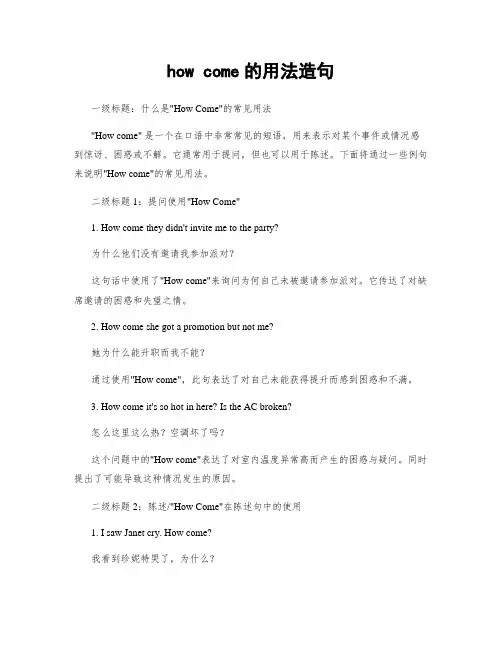
how come的用法造句一级标题:什么是"How Come"的常见用法"How come" 是一个在口语中非常常见的短语,用来表示对某个事件或情况感到惊讶、困惑或不解。
它通常用于提问,但也可以用于陈述。
下面将通过一些例句来说明"How come"的常见用法。
二级标题1:提问使用"How Come"1. How come they didn't invite me to the party?为什么他们没有邀请我参加派对?这句话中使用了"How come"来询问为何自己未被邀请参加派对。
它传达了对缺席邀请的困惑和失望之情。
2. How come she got a promotion but not me?她为什么能升职而我不能?通过使用"How come",此句表达了对自己未能获得提升而感到困惑和不满。
3. How come it's so hot in here? Is the AC broken?怎么这里这么热?空调坏了吗?这个问题中的"How come"表达了对室内温度异常高而产生的困惑与疑问。
同时提出了可能导致这种情况发生的原因。
二级标题2:陈述/"How Come"在陈述句中的使用1. I saw Janet cry. How come?我看到珍妮特哭了,为什么?这句话中的"How come"表明说话者对Janet的哭泣感到困惑和惊讶,希望知道引起她情绪波动的原因。
2. He always gets the best grades. How come?他总是得最好的成绩,怎么回事?"How come"在此句中表示对某人一直优秀表现的疑问。
说话者可能对这个现象感到不解或嫉妒。
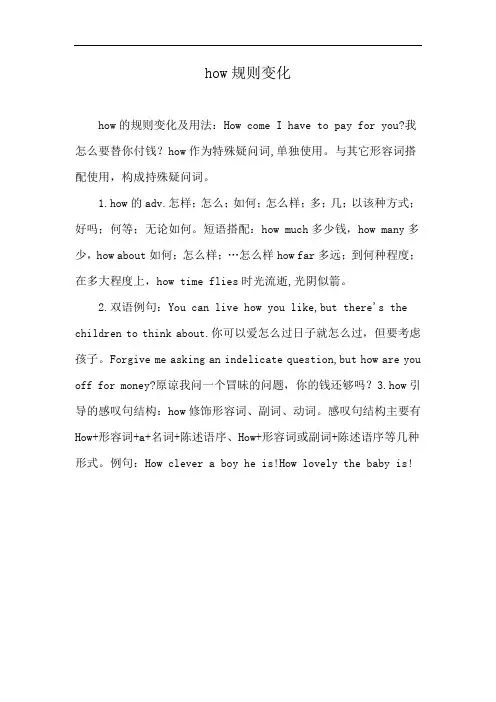
how规则变化
how的规则变化及用法:How come I have to pay for you?我怎么要替你付钱?how作为特殊疑问词,单独使用。
与其它形容词搭配使用,构成持殊疑问词。
1.how的adv.怎样;怎么;如何;怎么样;多;几;以该种方式;好吗;何等;无论如何。
短语搭配:how much多少钱,how many多少,how about如何;怎么样;…怎么样how far多远;到何种程度;在多大程度上,how time flies时光流逝,光阴似箭。
2.双语例句:You can live how you like,but there's the children to think about.你可以爱怎么过日子就怎么过,但要考虑孩子。
Forgive me asking an indelicate question,but how are you off for money?原谅我问一个冒昧的问题,你的钱还够吗?
3.how引导的感叹句结构:how修饰形容词、副词、动词。
感叹句结构主要有How+形容词+a+名词+陈述语序、How+形容词或副词+陈述语序等几种形式。
例句:How clever a boy he is!How lovely the baby is!。
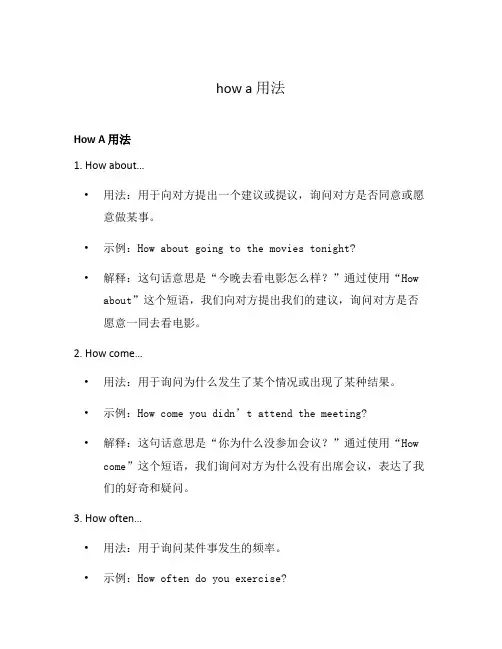
how a 用法How A 用法1. How about…•用法:用于向对方提出一个建议或提议,询问对方是否同意或愿意做某事。
•示例:How about going to the movies tonight?•解释:这句话意思是“今晚去看电影怎么样?”通过使用“How about”这个短语,我们向对方提出我们的建议,询问对方是否愿意一同去看电影。
2. How come…•用法:用于询问为什么发生了某个情况或出现了某种结果。
•示例:How come you didn’t attend the meeting?•解释:这句话意思是“你为什么没参加会议?”通过使用“How come”这个短语,我们询问对方为什么没有出席会议,表达了我们的好奇和疑问。
3. How often…•用法:用于询问某件事发生的频率。
•示例:How often do you exercise?•解释:这句话意思是“你多久锻炼一次?”通过使用“How often”这个短语,我们询问对方进行锻炼的频率,以了解对方日常生活中的锻炼习惯。
4. How long…•用法:用于询问某个动作或状态的持续时间。
•示例:How long have you been studying English?•解释:这句话意思是“你学英语学了多久?”通过使用“How long”这个短语,我们询问对方学习英语的持续时间,以了解他们的英语学习经历。
5. How to…•用法:用于询问如何完成某项任务或实现某种目标。
•示例:How to bake a cake?•解释:这句话意思是“如何烘焙蛋糕?”通过使用“How to”这个短语,我们询问该如何进行烘焙蛋糕的步骤,以获取达到目标所需的详细指导。
6. How much…•用法:用于询问事物的数量或价格。
•示例:How much does the T-shirt cost?•解释:这句话意思是“这件T恤多少钱?”通过使用“How much”这个短语,我们询问对方T恤的价格,以获得对方给予我们的物品所需的金钱数量。
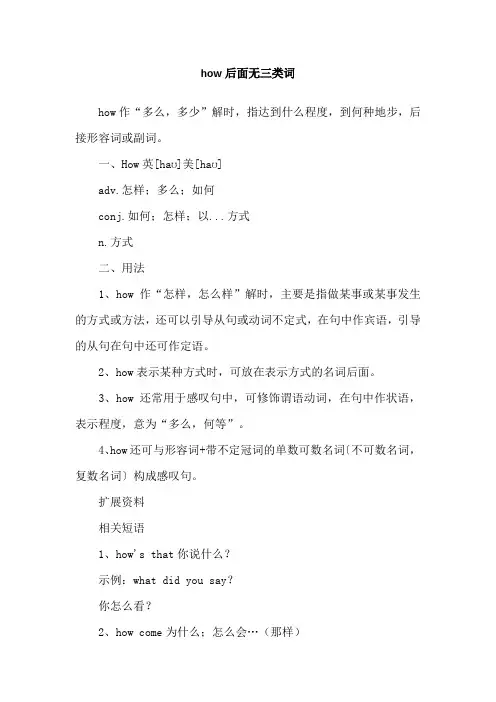
how后面无三类词
how作“多么,多少”解时,指达到什么程度,到何种地步,后接形容词或副词。
一、How英[haʊ]美[haʊ]
adv.怎样;多么;如何
conj.如何;怎样;以...方式
n.方式
二、用法
1、how作“怎样,怎么样”解时,主要是指做某事或某事发生的方式或方法,还可以引导从句或动词不定式,在句中作宾语,引导的从句在句中还可作定语。
2、how表示某种方式时,可放在表示方式的名词后面。
3、how还常用于感叹句中,可修饰谓语动词,在句中作状语,表示程度,意为“多么,何等”。
4、how还可与形容词+带不定冠词的单数可数名词〔不可数名词,复数名词〕构成感叹句。
扩展资料
相关短语
1、how's that你说什么?
示例:what did you say?
你怎么看?
2、how come为什么;怎么会…(那样)
示例:'How come we never know what's going on?'he groused “为什么我们对正在发生的事情总是一无所知?”他抱怨说。
3、how about(用于引出相关的新话题)怎么样,如何
示例:Well,I enjoyed that.How about you two?
嗯,我觉得那很棒。
你们俩呢?。
以下是整理的《常⽤英语⼝语8000句:表达“问候”的11种句型》,希望⼤家喜欢!1. How are you doing?你好吗?美国⼈见⾯时候最常⽤的打招呼⽅式就是: "Hey! How are you doing?" 或是 "How are you?" 不然 "How's going?" 也很常见.。
我觉得这种每天跟别⼈打招呼的习惯,就是跟美国友⼈建⽴良好关系的开始。
2. What's up?什么事?"What's up?" 也是很常⽤的⼀种打招呼⽅式.。
⽐⽅说 Bob 在路上看到我跟我说 "Hey! Kun-Lin!"那我通常就会答说 "Hi! Bob. What's up?" 这就是问对⽅近来怎样,有什么事吗?通常如果没什么事⼈家就会说 "Not much." 不过还有⼀种情况也很常见,你先跟⼈家说 "Hey! What's up?" 那别⼈也不说 "Not much",反⽽反问⼀句"What's up?" 所以 "What's up?" 已经变成有点 Hello! 的味道在⾥⾯了。
"What's up?" 也常被⽤来问⼈家有什么事?例如有⼈登门拜访, 你就会说 "What's up?" 到底有何贵⼲啊?总之"What's up?" 在美国应⽤的很⼴,各位⼀定要熟记才是。
我有⼀个从南⾮来的朋友David,他对于我的笔记本提供了很多的帮忙和建议。
他说在南⾮的打招呼⽅式是 "How zit?" 这是从 "How's it?"衍⽣变化⽽来。
How come ?请看下面一道高考题:--Susan, will you please go and empty that drawer?--________?A. What forB. What is itC. How is itD. How come答案:A本题检测考生在实际情景中运用英语进行交际的能力。
A、B、C三个选项考生比较熟悉,但是对How come这种说法并不熟悉,下面对How come在交际用语中以及其它一些用法进行归纳:I. How come...?How come是固定搭配,意为:怎么会......?怎么回事......?怎么搞的......?它和Why一样,可以用来引导一个问句。
所不同的是,如果用How come来提问,就表示你觉得某件事很奇怪,有点想不通;并且,以How come开头的问句使用的仍是陈述句的语序。
如:How come you didn't tell me earlier ? (=Why didn't you tell me earlier ?) 你怎么不早点儿告诉我?How come you didn't invite him to the party! He is your future boss. 你怎么没有邀请他参加晚会!他是你未来的老板。
另外,以How come开头的问句有时也可说成:How comes it (about) that... ? / How is it that... ? 如:How comes it that you're so late? (=How is it that you're so late?) 你为什么来得这么迟?II. What for?What for... ? 是询问什么原因或目的,相当于:Why...? / For what purpose...? 如:What do you need to borrow money for? I thought you had plenty of money. 你为什么需要借钱? 我本以为你有许多钱。
how come的用法一、"How Come"的用法和意义"How come"是一个常见的英语口语表达,用来询问某个事物或现象的原因或原因。
它可以理解为和"Why"类似,但更加口语化。
在本文中,我们将探讨"How come"的用法以及如何正确使用它。
二、 "How come"提问句的结构和用法"How come"常用于疑问句,有时也可以使用在陈述句中。
下面是一些示例:1. How come you're late for the meeting?你为什么会迟到会议?2. How come it's raining in July?七月份为什么会下雨?3. How come he didn't invite me to the party?他为什么没有邀请我去参加派对?4. How come she always gets higher grades than me?她为什么总比我拿到更高的分数?在以上示例中,我们可以看出"How come"通常跟随一个主语和动词,并且后面直接跟问题本身。
这种结构使得句子简单明了。
三、 "How come"与"Why"之间的区别虽然"How come"和"Why"都可用于询问原因,但它们之间存在一些细微的差异。
首先,在口语中,“How come”更普遍使用于美国英语而非英式英语(British English),而"Why"则更普遍使用于英国英语。
这并不意味着使用其中一种表达方式就是错误的,只是在选择时应该考虑到适用环境。
其次,"How come"更加口语化,常用于非正式场合。
与此相反,"Why"可以在正式和非正式场合中均可使用,并且显得更为中立和正式。
Unit 2 How often do you exercise?Section A新知点拨▶How come?为什么呢?How come?意为“为什么呢?”或“怎么会?”,相当于why,用于询问某事为什么会发生或为什么会存在某种情况.how come可单独使用,也可接陈述语序的从句.如:How come you didn't tell me about it?关于这件事你为什么不告诉我呢?名师讲坛频度副词表示次数、频率的副词称为频度副词.常用的频度副词按频率发生的高低依次为:always(100%), usually(80%), often(60%), sometimes(40%), seldom(20%), hardly ever(10%), never(0%).(1)频度副词在句中的位置:频度副词一般放在实义动词之前,be动词、助动词和情态动词之后,有时频度副词也可放在句首或句末.如:We never eat junk food.我们从不吃垃圾食品.Usually he goes online.他通常上网.(2)对频率进行提问,用特殊疑问词组how often(多久一次).How often do you exercise?你多久锻炼一次?自主探究一、看1a图画,把下列词汇或短语翻译成英语,将图上的对号入座.1.看电视_________ ( )2.锻炼_________ ( )3.读书_________ ( )4.帮助做家务_________ ( )5.去购物_________ ( )二、写出下列频度副词的汉语意思._________ __________________ _________5.hardly ever_________ _________三、听2a和2b的对话,在空白处填入正确的内容,每空词数不限.Cheng Tao is a middle school student. He watches TV about 1. _________ He 2. _________ every day at school. He 3. _________ maybe once a month. He exercises about 4. _________ He shops about 5. _________.四、阅读2d的对话,回答下列问题.1.Is Claire free next week?____________________________________________________________________________________________ 2.When does Claire have dance lessons?____________________________________________________________________________________________ 3.How often does Claire have piano lessons?____________________________________________________________________________________________ 4.What does Claire do on Tuesday?____________________________________________________________________________________________五、根据要求完成下列句子.1.She goes to the movies three times a month.(对画线部分提问)How_________ _________ she_________ to the movies?2.I always exercise after school.(改为否定句)I_________ exercise after school.3. Claire wants to learn swing dance.(对画线部分提问)_________ _________ _________ dance_________ Claire want to learn?4.The bottle is filled with water.(改为同义句)The bottle_________ _________ _________ water.5.I have piano lessons on Friday and Saturday.(对画线部分提问)_________ _________ you have piano lessons?六、巩固所学内容.A)根据句意及所给汉语或首字母提示写出单词.1.Jim often does_________ (家务劳动)at home.2.Now lots of students get information from the_________ (互联网).3.Did you_________ (曾经)want to go out to play soccer?4. My sister likes watching TV. Her favorite p_________ is Animal World.5.There were 500 people in that supermarket at l_________.B)从方框里选择合适的单词或词组填空.6.-Do you go shopping on weekends all the time?-Yes, I_________ go shopping on weekends.7.Alice likes writing to me, but_________ she calls me.8.-Do you have any friends in this city?-No, I_________ came to this city. It's my first time here.9.My sister_________ goes to the library on Tuesdays, but sometimes on Fridays.10. Eating too much ice-cream is not good for our health, so I_________ eat it.七、单项填空.1.-Do you know that old woman?-Yes, she is Mrs. Green. And she_________ leaves her house because she can't walk far.A. usuallyB. everC. hardly everD. always_________ does she practice the piano?-Every day.A. How longB. How farC. How oftenD. How much3.-Susan, I'm sorry that I can't go to your birthday party.-_________?A. What aboutB. What is itC. How is itD. How come_________ he usually_________ on weekends?-He usually helps his parents at home.A. does; doB. does; doesC. do; doD. do; does5. Most students read English books_________.A. every dayB. every daysC. everydayD. everydays八、翻译句子.1.她每周至少弹一次钢琴.(at least)____________________________________________________________________________________________ 2.他们每天学习摇摆舞.(swing dance)____________________________________________________________________________________________3.我妈妈从来不熬夜.(never)____________________________________________________________________________________________ 4.我每周锻炼三次.(exercise)____________________________________________________________________________________________ 5.我爷爷总是下午去散步.(go for a walk)____________________________________________________________________________________________ 6.你有时感到难过吗?(sometimes)____________________________________________________________________________________________ 答案:一、1.watch TV; d 2.exercise;c 3.read books; b 4.help with housework; e 5.go shopping; a二、1.总是,一直 2.通常 3.经常 4.有时 5.几乎从不 6.从不,绝不三、1.twice a week 2.reads 3. goes to the movies 4. three times a week 5,twice a month四、1.No,she isn't.2. Every Monday.3.Twice a week.4.She plays tennis with her friends.五、1.often does; go 2.never 3,What kind of; does 4.is full of 5. When do六、A)1.housework 2. Internet 3. ever 4. programB)6.always 7.sometimes 8.never 10.hardly ever七、1~5 CCDAA八、1.She plays the piano at least once a week.learn swing dance every day.3.My mother never stays up late.4.I exercise three times a week.5. My grandfather always goes for a walk in the afternoon.6. Do you sometimes feel sad?Section B新知点拨▶1. How many hours do you sleep every night?你每晚睡几个小时?How many 意为“多少”,用来提问可数名词的量.▶2. the answers to our questions我们问题的答案名词answer之后常接介词to表示“······的答案”.类似的短语还有:the key to the door这扇门的钥匙the way to the bank去银行的路▶的用法although是连词,意为“虽然,尽管”,用来引导让步状语从句.although不能和but在同一个句子中出现,两者只能用其中一个.如:Although it was cold, the boys still played outside.It was cold, but the boys still played outside.尽管很冷,男孩们仍然在外面玩.▶4. It is good to relax by using the Internet or watching game shows...通过使用网络或观看游戏类节目放松是不错的······by doing sth.意为“通过做某事”.by是介词,此处意为“通过,靠”,表示方式、方法或手段.▶5.such as 比如,例如such as意为“例如”,多用来列举同类人或事物中的几个例子,such as之前一般用逗号与主句隔开,后面直接加名词或名词性短语.如:She has a lot of hobbies, such as reading, singing and drawing.她有许多业余爱好,例如阅读、唱歌和画画. ▶6.however 然而however是副词,意为“然而;无论如何”,可位于句首、句中或句末.如:She was tired. However, she still went to work.她很累.然而,她还是去工作了.His sister, however, had other ideas.她的姐姐,然而,有其他的想法.▶7.more than 多于more than 相当于over,意为“超过,多于”,其反义词为less than.▶8.almost 几乎;差不多almost是副词,意为“几乎;差不多”,一般置于实义动词之前,be动词、助动词和情态动词之后,一般不置于句末.如:I almost came late to school.我几乎上学迟到.自主探究一、预习1a,1b,然后听1c的对话,在空白处填入正确的内容,每空词数不限.Tina has 1.________ habits. She exercises 2. ________ She eats 3. ________ every day. She sleeps 4. ________ hours every night and she loves milk. She drinks it every day. She 5. ________ drinks coffee. As for junk food, she eats it 6. ________.But Bill doesn't have good habits. He 7. ________ exercises. Although he sometimes eats vegetables, he never eats 8.________ and he never drinks 9.________. He drinks 10.________ four times a day. He loves junk food and he eats it three or four times a week. Although he sleeps nine hours every night, his lifestyle is unhealthy.二、把下列短语翻译成英语.1.对······有好处________2.百分之十五________3.上网________4.例如________5.多于________6.少于________三、阅读3a的短文,回答下列问题.1.How often does Jane exercise?________________________________________________________________________________________ 2. How long does Jane usually watch TV a day?________________________________________________________________________________________ 3. Why are Jane's parents not happy with her?________________________________________________________________________________________ 4.Why does Jane not go to the dentist?________________________________________________________________________________________四、根据句意及所给汉语提示写出单词.1.On the Chinese New Year's Eve, Chinese families usually get________ (在一起)to have a big dinner.2.Please keep in________ (头脑)that spending too much time on computer is bad for you.3.Do you know the________ (结果)of the sports meeting?4.The child does some exercise every day in order to build up his________ (身体).5.They walked________ (穿过)the forest and arrived at the small house yesterday.五、单项填空.1.-What do you often do on weekends?-I often go________ online.A. aB. anC. theD./2.-What do you think of milk?-It is good________ people's health.A. atB. forC. withD. through3.-Would you like some________?-Yes, please. I like drinking it.A. noodlesB. beefC. pearsD. coffee ________ the results________ the students' activity survey.A. is; withB. are; ofC. is; ofD. are; with5.It's raining hard. ________, I still want to go there.A. SoB. HoweverC. LuckilyD. Then六、根据汉语提示完成下列句子.1.我的妈妈想让我每天喝牛奶.My mother wants me________ ________ milk every day.2.锻炼对心智和身体有好处.Exercise________ ________ ________ the________ and the________.3.你多久去看一次牙医?________ ________ do you go to see a dentist?4.许多学生使用电脑是为了娱乐而不是为了家庭作业.Many students use the computer________ ________ ________ ________ homework.答案:一、1.good 2.every day 3. vegetables and fruit 4.nine 5. never6. two or three times a week7.hardly ever8.fruitk二、1.be good for 2. fifteen percent 3. go online 4.such as 5. more than 6.less than三、1.Every day.2. More than two hours.3. Because she hardly ever helps with housework and she never goes to the dentist for teeth cleaning.4.Because she is afraid.四、1. together 2. mind 3. result五、1~5 DBDBB六、1.to drink 2.is good for; mind; body3.How often4.for fun not forSelf Check自主探究一、完成Self Check 1.把下列句子翻译成汉语.1.They often go to the movies on weekends.________________________________________________________________________________________ 2. He sometimes reads newspapers.________________________________________________________________________________________ 3.I hardly ever eat junk food.________________________________________________________________________________________ 4. She never helps her daughter with her homework.________________________________________________________________________________________ 5. My father always gets up early.________________________________________________________________________________________二、完成Self Check 3,回答下列问题.1.How often do Tom and Mike go to the museum?________________________________________________________________________________________ 2. How often do Tom and Mike go to the shopping center?________________________________________________________________________________________ 3.How often do Tom and Mike watch TV?________________________________________________________________________________________三、短文填空.阅读短文,用所给单词的适当形式填空.It is very important to stay healthy. I have a neighbor. She is an old woman. She can do all the housework, read newspapers, watch TV and search on the Internet to learn 1. ________ (anything) new. I often see her do Tai Chi in the morning and dance in the evening. She 2. ________ (look) young and beautiful though she is overseventy. Last week a 3.________ (report) from a magazine interviewed(采访)her and asked how she 4.________ (keep) so young and healthy. She replied(回答)with a smile:“Staying young and healthy is quite easy, Keep your mind active and learn at 5. ________ (little) one new thing every day. Try to do 6. ________ (difference) kinds of housework and do sports as often as you can. Don't think you are too old 7. ________ (go)back to school. I know a man who went to a medical college when he was 70 years old. He 8.________ (study) there for 6 years and now he is a doctor. Another man went to a tennis school at the age of 71 and now he is good at 9. ________ (play) tennis. Some people may say staying young is easy only for those who live in the future. In fact, no matter how old you are, you can 10. ________ (make)it.”Please tell the story to your family. I hope all people will stay young and healthy.四、单项填空.1. ________ my mother was very tired, she still stayed up late to buy a lot of things online on November 11th.A. WhenB. AlthoughC. IfD. So2.-Does the girl have a healthy habit?-Yes, she does. She dislikes junk food, ________ hamburgers and ice-cream.A. more thanB. such asC. less thanD. at least3. Ten percent of my classmates________ to school by car.A. goesB. goC. goingD. to go4.-What does your mother do?-She is a(n) ________.She works in a hospital.A. actressB. teacherC. artistD. dentist5.You are not healthy at all. You need to eat________ fast food and exercise________.A. more; lessB. less; lessC. more; moreD. less; more答案:一、1.他们经常周末去看电影.2.他有时看报纸.3.我几乎从不吃垃圾食品.4.她从不帮助她女儿做家庭作业.5.我父亲总是早起.二、1.Sometimes,2. Hardly ever. Maybe about twice a month,3, Mike never watches TV, but Tom watches TV every day. 三,1,something 2,looks 3,reporter 4.kept 5,least6, different 7, to go 8, studied 9, playing四、1~5 BBBDD。
howcome的用法一、简介How come是一个常用的英语口语短语,通常用于提出疑问或质疑某个现象、情况或行为的原因。
它在口语交流中起到了 "为什么" 的作用,但与 Why 不同的是,How come更加易于理解且用途广泛。
本文将详细介绍How come的用法及相关注意事项。
二、表达询问原因How come常被用来表达对某一事物或现象产生疑问,并希望得到合理解释。
它可在正式场合,也可以在日常对话中使用。
例如,在工作中,我们可能会遇到以下问题:“Mary was promoted to team leader. How come? She has only been working here for a few months.”(玛丽被提升为团队负责人了,这是怎么回事?她才在这儿工作几个月而已)三、使用方式在口语中,How come通常跟着一个人称代词或名词短语来构成一个完整的句子。
它可出现在句首或句中部分。
然而,在句首使用更加普遍和自然。
例如,“How come he didn't show up at the party?”(他怎么没有出现在聚会上呢?)四、与Why 区别虽然How come和Why都可以表达为什么的意思,但它们之间有一些微妙的差别。
一般而言,How come更常用于对具体行为、事件或情况提出疑问,而Why更适用于推理和深层原因的解释。
“How come you're late?”(你为什么迟到呢?)关注的是行为本身,在此情景中我们想知道发生了什么;而"Why are you always late?"(你为什么总是迟到?)更偏向于一种习惯性的推理。
五、常见回答模式当他人对某事询问“How come...?”时,我们需要给予合适且简明扼要的回答。
下面是几种常见回答模式:- 说明原因: "How come I can't find my keys?"(我怎么找不到我的钥匙呢?) 可以回答:"You probably left them in your office."(你可能把它们落在办公室里了。
how come的用法和意思一、"How come"的意思和用法简介在日常英语口语中,"How come"是一个非正式的表达方式,特别常用于美国英语和加拿大英语中。
它通常用来询问某个事情或情况的原因或解释。
在本文中,我们将探讨"How come"这一短语的基本意思、用法,并提供一些例句以便更好地理解。
二、 "How come"作为“为什么”的替代"How come"经常被当做疑问句中的“为什么”来使用,有时也可以当做陈述句中“因为…”的引导词。
下面是几个例子:1. 疑问句:"How come you didn't attend the meeting?"这句话相当于:“Why didn't you attend the meeting?”意思是询问对方为什么没有参加会议。
2. 陈述句:"I can't go to the party tonight. How come? I have a doctor's appointment."这里的“How come?”可以理解为:“Because I have a doctor's appointment。
”此处表示对方不能参加派对的原因是他有一个医生预约。
通过上述例子可以看出,“How come”可作疑问词引导与“why”完全等同,也可作陈述词引导后接原因。
三、 "How come"体现强调和惊讶的情感除了询问原因,"How come"还能在一些情境中体现强调或惊讶的情感。
1. 强调:“You're eating fast food again? How come you don't cook at home?”在这个例句中,“How come”强调了对方经常吃快餐而不自己做饭的事实。
How come 的用法
How come的用法请看下面一道高考题:
-Susan, will you please go and empty that drawer?
-________?
A.What for
B. What is it
C. How is it
D. How come答案:A
本题检测考生在实际情景中运用英语进行交际的能力。
A、B、C 三个选项考生比较熟悉,但是
对How come这种说法并不熟悉,
下面对How come在交际用语中以及其它一些用法进行归纳: I. How come...? How come是固定搭配意为怎么会是固定搭配,意为怎么会......?怎么回事意为:怎么会怎么回事......?怎么搞的怎么搞的......?它和Why 一怎么回事怎么搞的它和可以用来引导一个问句。
来提问,就表示你觉得样,可以用来引导一个问句。
所不同的是如果用How come来提问就表示你觉得可以用来引导一个问句所不同的是,如果用某件事很奇怪,有点想不通并且,以有点想不通;并且某件事很奇怪有点想不通并且
以How come开头的问句使用的仍是陈述句的语序。
语序。
如:How come you didn't tell me earlier ? (=Why didn't you tell me earlier ?) 你怎么不早点儿告诉我? Howcome you didn't invite him to the party! He is your future boss. 你怎么没有邀请他参加晚会!他是你未来的老板。
另外,以开头的问句有时也可说成:How comes it (about) that... ? / 另外以How come开头的问句有时也可说成How is it that... ?
如: How comes it that you're so late? (=How is it that you're so late?) 你为什么来得这么迟? II. What for... ? What for... ? 是询问什么原因或目的,相当于:Why...? / For what purpose...? 如: What do you need to borrow money for? I thought you had plenty of money. 你为什么需要借钱? 我本以为你有许多钱。
-Let's go and have a good drink tonight.
-________ Have you got the first prize in the competition?
A. What for?
B. Thanks a lot.
C. Yes, I'd like to.
D. Why not? 答案: A
III. How about...? / What about... ? 1. 用来询问情况或打听消息等,意为:......怎么样?......如何?
如: How about your English exam yesterday? 你昨天的英语考得怎么样? -How are you getting on with your work? 你工作情况如何? -Not bad. What about you? 不错,你呢? 2. 用来提出请求、建议或征求对方意见,后面除跟sth. 外,还可跟动名词doing,意为:你认为......怎么样?......如何?如: How about the two of us ________ a walk down the garden? A. to take B. take C. taking D. to be taking 答案: C IV. Why (not)...? Why not...? 用来向对方提出一个建议,意思是"何不......?" 它是一个省略形式的问句,相当于Why don't you / we...? 如: Why not go home now? = Why don't you go home now? 你为什么现在不回家呢? Why not
go out for a walk? = Why don't we go out for a walk? 我们何不出去散散步呢? 注意:Why not 后面必须接动词原形,即Why not do...? 如: -I usually go there by train. -Why not ________ by boat for a change? A. to try going B. trying to go C. to try and go D. try going 答案: D V. If only... If only 意思是"但愿......;要是......就好了",常引导虚拟语气的条件句或感叹句,用来表示说话人对某事所寄予的某种强烈愿望,相当于as long as。
如: If only I were as clever as you!要是我像你一样聪明该多好啊! If only we had arrived in time, we would not have missed the train. 要是我们按时到, 就不会误车了。
If only it would stop raining! 但愿雨停下来。
注意: only if 也引导条件状语从句,表示"只有......(才);只有在......的时候;唯一的条件是......"的意思;与if 引起的条件句相比,语气更强。
如: He will succeed only if he does his best. 他只有尽力而为才能成功。
I'll come only if you really need me. 只有当你真正需要我的时候,我才来。
VI. What if...? What if...? 句型可用于两种情况:一是提出建议,问别人"意下如何,是否可行",相当于:What do you think if... ?二是用于询问将来可能发生的事或面临的情况,表示恐惧、忧虑,有"万一"之意。
如: What if we go and see a film tomorrow night? 我们明晚去看电影好吗? What if we get burgled while we're on holiday? 要是我们度假时家里被撬了怎么办? What if I came tomorrow instead of this afternoon?如果我今天下午不来明天
来你以为如何? That was very clever, but what if the plan had failed. 那是很高明的,不过这个计划若是失败了,结果会怎么样呢?。